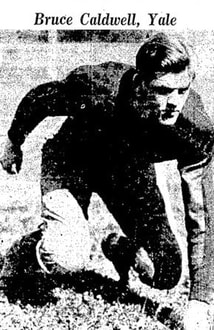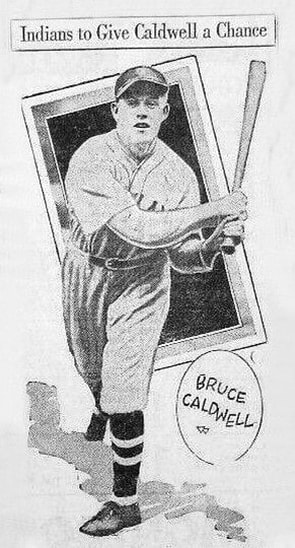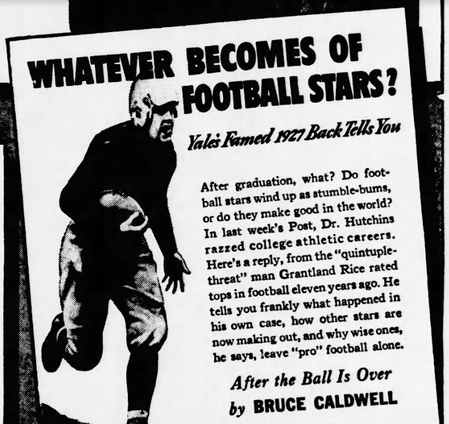The Pride of Ashton

Bruce "Skit" Caldwell was one of the greatest Rhode Island-born athletes ever. He grew up in Ashton, a historic district of Cumberland. He graduated from Cumberland High School where he starred in both baseball and football. He attended Brown University in 1924 continuing his two-sport ways but not without future controversy. He transferred to Yale University (as a freshman) the next year. After successful sophomore and junior play, he was considered a future All-American at half back. Then suddenly it was discovered he had violated the "Big Three" eligibility rules, unwittingly, by playing two games as a freshman at Brown before entering Yale. A Providence Journal reporter had written about his Brown record, and cited the Yale-Harvard-Princeton agreement not to use any player who had been a competitor on any other college football team. He was declared ineligible on the eve of the Yale-Princeton game. The Yale A.A. broke a rule and awarded him a letter regardless and a gold watch. After the close of the season, Northern Rhode Island turned out a parade and testimonial banquet for its disqualified football star. He played in the East-West game that season and was still named All-American at half-back. Though barred from the gridiron he remained at Yale and continued to star at baseball with a .413 batting average.
|
After he graduated from Yale in 1928, he signed a Major League contract with the Cleveland Indians. Called up from the New Haven Bulldogs (EL) he batted .222 for the Tribe. Football still beckoned and he signed a one-year contract with the New York Giants playing his only season of professional football. Wearing #48 at tail back his return to Providence against the Steam Roller set an attendance record. He formed the Bruce Caldwell All Star Football Team, made up of collegians from around the country barnstorming throughout Connecticut and Eastern League towns, rocking the gate and pummeling elevens made of local semi-pros. He resigned with the Indians organization in 1929 and played in the minor leagues before returning to the Majors with the Brooklyn Dodgers in 1932. Caldwell was a major success in the minors from 1929 to 1932. He had a career .356 BA and a .629 slugging % with New Haven Profs (EL), Albany Senators (EL), Minneapolis Millers (AA) and New Haven Bull Dogs (EL). In 1931 he won the Eastern League Triple Crown with the Bull Dogs (.356, 38 HR, 130 RBI) as part owner of the team. His Dodger stint was short lived (7 games) and he finished his career with Harrisburg (NYPL) choosing to attend Yale Law School. He continued to play baseball while practicing law with the Bay Parkways, a powerhouse semi-pro nine.
|
|
Caldwell is a true American story. He rose from the Rhode Island mill town of Ashton. He was educated beyond his class at America’s most prestigious University, where he was a star athlete, and would later return to earn a Law degree. He would go on to serve in the Navy during the War and earn the rank of Lt. Commander. On December 10, 1938, the Saturday Evening Post published an article by Caldwell titled, “After the Ball Is Over.” The article was Caldwell’s answer to those who asserted that collegiate athletics impeded the development of students. The modest Cumberland boy explained what sports meant to him. “I am convinced that if I had not learned to get up off the ground groggy and carry the ball in another try to gain in football, I never would have had what it took to tackle law school, to win my degree, and finally, to keep on hitting the line until I landed where I was determined to be. If it had not been for what I learned in athletics . . . I don’t believe I could have changed my course and have persevered on my new course until I reached my goal.”
|


